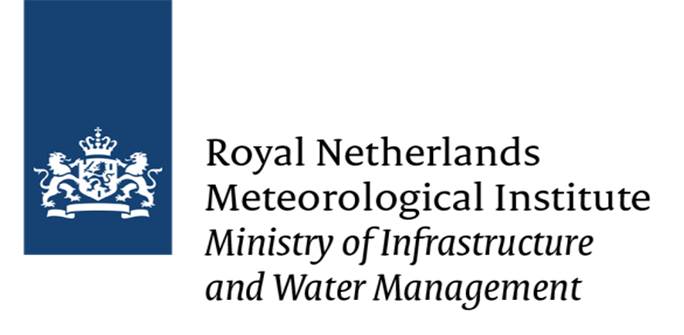 The Royal Netherlands Meteorological Institute (KNMI) is the national research and information centre for weather and climate change in the Netherlands. KNMI has much experience in operational and scientific activities. Operational expertise includes weather forecasts and alerts, data dissemination, and climate change services in support of national adaptation. Research at KNMI specialises in observing and understanding the weather/climate system, in order to improve weather forecasts and climate projections. KNMI has contributed (coordinating) lead authors to the IPCC-WGI-AR5 report and KNMI is responsible for the development and dissemination of the national climate change scenarios for adaptation. KNMI hosts the WMO regional climate centre node on data for Europe (ECA&D); is responsible for the ozone satellite instruments OMI and TROPOMI; participates in ESA-CCI and in JPI-Climate; provides the programme manager of the EUMETNET Climate Capability in which 25 European Meteorological Services collaborate; and maintains the Climate Explorer web portal: climexp.knmi.nl.
The Royal Netherlands Meteorological Institute (KNMI) is the national research and information centre for weather and climate change in the Netherlands. KNMI has much experience in operational and scientific activities. Operational expertise includes weather forecasts and alerts, data dissemination, and climate change services in support of national adaptation. Research at KNMI specialises in observing and understanding the weather/climate system, in order to improve weather forecasts and climate projections. KNMI has contributed (coordinating) lead authors to the IPCC-WGI-AR5 report and KNMI is responsible for the development and dissemination of the national climate change scenarios for adaptation. KNMI hosts the WMO regional climate centre node on data for Europe (ECA&D); is responsible for the ozone satellite instruments OMI and TROPOMI; participates in ESA-CCI and in JPI-Climate; provides the programme manager of the EUMETNET Climate Capability in which 25 European Meteorological Services collaborate; and maintains the Climate Explorer web portal: climexp.knmi.nl.
KNMI has experience in many FP7 projects, including the MACC project and the precursor projects for the Copernicus Climate Change Service. KNMI is responsible for the overarching coordination of ERACLIM2, UERRA, QA4ECV, CLIPC and EUCLEIA, and participates in four of these ongoing FP7-SPACE projects. UERRA is a continuation of the EURO4M project which KNMI co-ordinated. EURO4M prepares for a regional reanalysis for Europe, develops in situ reference datasets such as E-OBS (which is updated every month) and issues user-driven climate indicator bulletins. QA4ECV is also coordinated by KNMI. In CLIPC, KNMI exploits the software developed in ENES and IS-ENES2 for data visualisation and dissemination. This INSPIRE-compliant software makes use of OGC standards and has been implemented in the prototype data and information portal: climate4impact.eu. It enables users in the climate impact community to access CMIP5 climate model data, and forms the basis for similar delivery tools of EUPORIAS and SPECS. The technology behind will be used in CLIPC for disseminating climate data, model predictions and scientific climate indicator information to climate impact users. Using their strong scientific background KNMI is also involved in the science part of SPECS, developing trustworthy seasonal to decadal predictions with the EC-Earth climate model, a global Earth system model based on the ECMWF seasonal prediction system. In EUCLEIA, KNMI is responsible for the fast-track attribution of meteorological extreme events, physical understanding of past extreme events and simulations with EC-Earth for a pre-operational attribution system. Finally, KNMI has coordinated ECLISE, which together with CLIMRUN has prepared for sector specific climate information services at the European scale.
KNMI co-leads WP4 on Outreach and Dissemination (with STFC) and contribute to WP1 on the creation of homogeneous station series for Europe and to WP3 on the provision of independent data for validation.